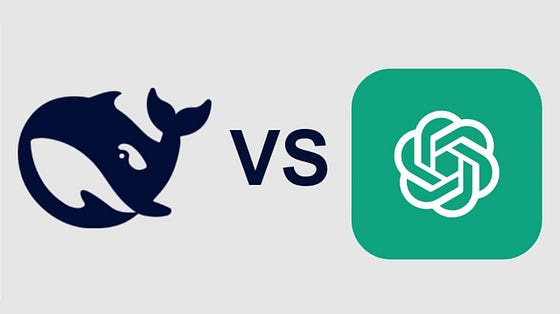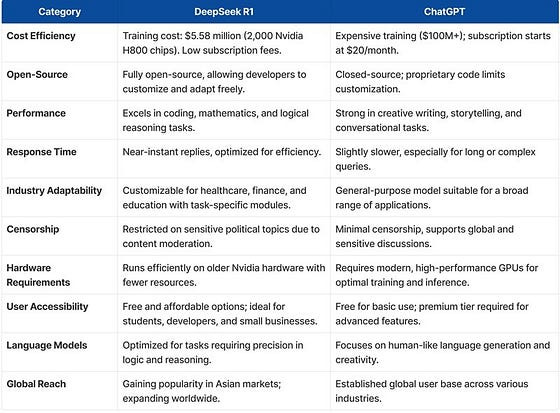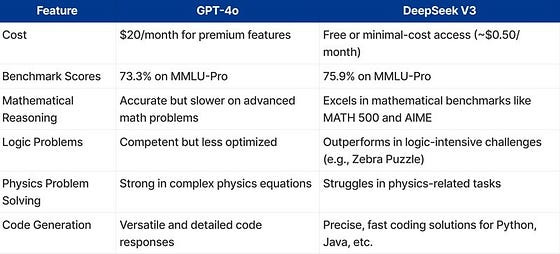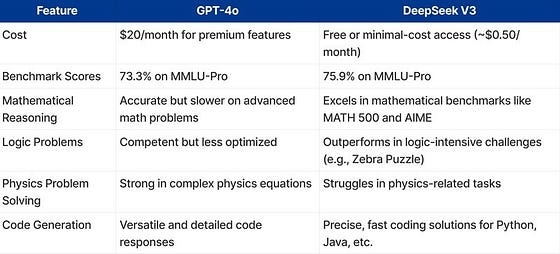DeepSeek Vs. ChatGPT: Which One is Better?
Find out why DeepSeek has surpassed ChatGPT and become the most talked-about AI of 2025.
Artificial Intelligence (AI) continues to transform industries, and the competition between these AI giants is more unexpected than ever. DeepSeek is a Chinese AI startup that has emerged as a formidable competitor to OpenAI’s ChatGPT.
With its cost-efficient model, unique capabilities, and innovative design, DeepSeek has shaken the AI landscape and set a new bar. So this article includes details about what DeepSeek is, how it works, its strengths, and its comparison with ChatGPT. We’ll also explore its impact on the industry and whether it truly outshines ChatGPT.
What is DeepSeek?
DeepSeek is an AI startup based in Hangzhou, China, founded in 2023 by Liang Wenfeng. The company specializes in developing large language models (LLMs) with a focus on open-source accessibility and cost-efficient design. Its flagship model, R1, has redefined what can be achieved with minimal resources while maintaining high performance.
By leveraging older, less advanced Nvidia chips and implementing optimization techniques, DeepSeek achieved training costs that are a fraction of those required by leading U.S.-based models like ChatGPT.
How DeepSeek Works?
DeepSeek’s innovative approach centers on efficiency. Its R1 model was trained on approximately 2,000 Nvidia H800 chips over 55 days, costing only $5.58 million. By contrast, U.S.-based models like ChatGPT often require hundreds of millions of dollars in computational resources.
Core Mechanisms:
Hardware Optimization: DeepSeek leverages older Nvidia chips, maximizing output through advanced engineering techniques.
Focus on Inference-Time Computing: Instead of expensive training cycles, DeepSeek prioritizes efficient real-time processing, reducing infrastructure needs.
Open-Source Framework: Its codebase is freely available, allowing developers worldwide to customize and adapt the model.
This combination of cost efficiency and technical refinement positions DeepSeek as a viable alternative to resource-heavy models like ChatGPT.
What Can DeepSeek Do?
DeepSeek’s capabilities extend beyond traditional AI functionalities, making it particularly suitable for technical and industry-specific applications.
Mathematical Reasoning: DeepSeek outperforms competitors in solving complex mathematical problems, from algebra to advanced logic puzzles.
Coding and Development: Its ability to generate accurate code in Python, Java, and other languages positions it as a valuable tool for developers.
Real-Time Applications: DeepSeek’s fast response times make it ideal for live translations, customer support, and real-time analytics.
Industry-Specific Adaptations: It is tailored for sectors like healthcare, finance, and education, offering customizable solutions that align with business needs.
Affordability: With its lightweight design and low-cost pricing models, DeepSeek is accessible to students, small businesses, and startups.
Why is DeepSeek Different from Other AIs?
DeepSeek stands out for its innovative features, which challenge the traditional norms of AI development:
Cost-Effective Training: By using older hardware and focusing on optimization, DeepSeek achieves high performance at a fraction of the cost.
Open-Source Philosophy: Unlike proprietary systems, DeepSeek’s open-source model allows users to adapt and expand its capabilities.
Targeted Precision: DeepSeek prioritizes technical accuracy, excelling in logic, coding, and reasoning tasks.
Scalable Design: Its minimal hardware requirements make it accessible even to resource-constrained organizations.
How DeepSeek Crossed ChatGPT
DeepSeek has surpassed ChatGPT in specific benchmarks, gaining traction among users and reshaping industry perceptions. Key milestones include:
Top App Store Rankings: DeepSeek R1 became the top free app on the U.S. App Store, outpacing ChatGPT in downloads.
Benchmark Success: It outperformed ChatGPT in logic, math, and coding challenges, proving its technical superiority.
Aggressive Pricing Strategy: DeepSeek’s affordability attracted a broader audience, including students and small businesses.
This combination of accessibility, precision, and cost-efficiency disrupted the AI Agents market and spurred global interest in alternative AI solutions. Moreover, these achievements disrupted the AI market, forcing tech giants like Nvidia, Alphabet, and Microsoft to reassess their strategies.
DeepSeek vs. ChatGPT: Feature Comparison
While DeepSeek dominates technical tasks, ChatGPT remains the preferred choice for creative writing, storytelling, and conversational AI.
Is DeepSeek Better Than ChatGPT?
The answer depends on user priorities. DeepSeek excels in:
Technical precision (logic and coding).
Low-cost access and affordability.
Open-source adaptability.
ChatGPT remains unmatched for:
Creative tasks and natural language generation.
Wide-ranging conversational capabilities.
Unrestricted global access and coverage.
DeepSeek may not replace ChatGPT but serves as a complementary solution for users focused on technical tasks and cost-efficiency.
Also Read:
Top Key-Features to Look for in Healthcare CRM Software in 2025
Develop a Warehouse Management System (WMS) Like NetSuite: Cost, Features & Implementation Guide
GPT o1 vs DeepSeek R1: Which One is Better?
GPT o1 is ideal for versatile, creative, and conversational tasks, whereas DeepSeek R1 is best suited for technical and cost-efficient solutions, especially in coding and logic-based applications.
GPT-4o vs DeepSeek V3: Key Differences
DeepSeek V3 outperforms GPT-4o in specific benchmarks like math and logic tasks but falls short in areas requiring detailed physics problem-solving and broader versatility. GPT-4o provides a more balanced, generalized AI experience.
How DeepSeek Impacted ChatGPT?
DeepSeek’s rise has had a profound impact on the AI industry:
Market Disruption: Nvidia’s stock dropped significantly after DeepSeek’s debut, highlighting fears of a cost-effective alternative.
Investment Revaluation: Companies are shifting focus to more efficient, scalable AI solutions.
Innovation Shift: DeepSeek’s open-source philosophy has inspired competitors to reconsider their proprietary approaches.
These changes underscore DeepSeek’s role as a disruptive force, reshaping the competitive dynamics of the AI market.
Conclusion
DeepSeek represents a bold step forward in AI innovation, proving that high performance doesn’t require exorbitant costs. While it excels in logic and technical tasks, ChatGPT’s versatility ensures it remains a dominant player in the AI space. Together, these models illustrate the diversity and potential of modern AI, catering to a wide range of needs and preferences.
As AI continues to evolve, which model fits your needs best — DeepSeek or ChatGPT? Let IBR Infotech team know about your thoughts and experiences below!





